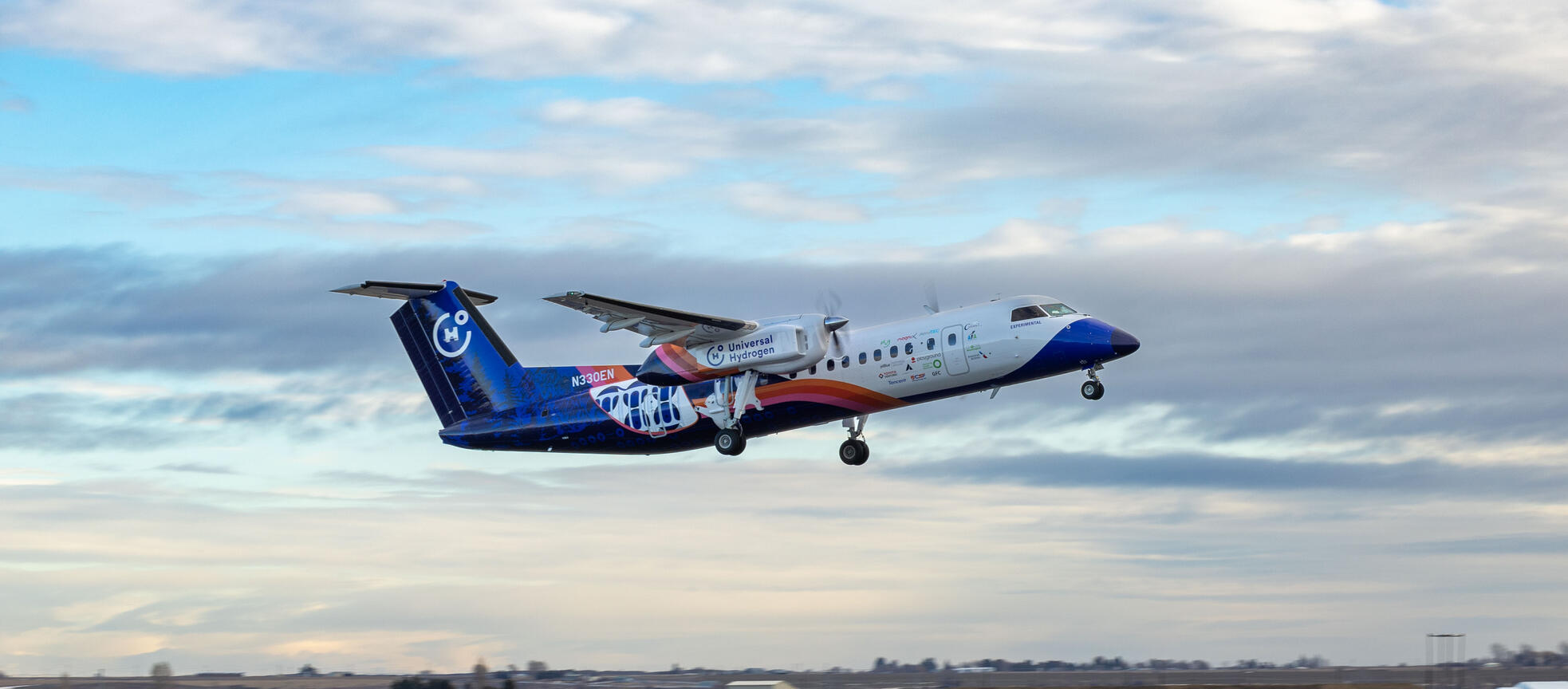EF Global VTOL
03 Jul 2023

A second hydrogen-powered regional airliner has just made its debut flight. Universal Hydrogen successfully tested its hydrogen-powered propulsion system for the first time on Thursday. The company’s De Havilland Dash 8-300 turboprop testbed—retrofitted with a hydrogen fuel cell in one of its nacelles and nicknamed "Lightning McClean"—took off from Grant County International Airport in Moses Lake, Washington, at 8:41 a.m. local time and flew for 15 minutes, reaching an altitude of 3,500 feet.
The historic flight test occurred just six weeks after rival hydrogen propulsion system ZeroAvia achieved the first flight of its hydrogen-powered Dornier 228 aircraft testbed at Cotswold Airport in the UK, making it the first company to fly a regional airliner powered by hydrogen fuels.
While Universal Hydrogen was not the first, it has flown the largest hydrogen fuel cell-powered airplane. The Dash 8 seats 40 passengers, while the Dornier 228 has 19 seats. Overall, Universal Hydrogen’s Dash 8 is the second-largest hydrogen-powered airplane to fly to date; the largest was the Soviet Tupelov Tu-155 testbed, which flew on liquid hydrogen fuel in 1988.
Universal Hydrogen chief test pilot and former U.S. Air Force test pilot Alex Kroll was at the helm of Lightning McClean during the flight on Thursday. “During the second circuit over the airport, we were comfortable with the performance of the hydrogen powertrain, so we were able to throttle back the fossil fuel turbine engine to demonstrate cruise principally on hydrogen power,” said Kroll. “The airplane handled beautifully, and the noise and vibrations from the fuel cell powertrain are significantly lower than from the conventional turbine engine.”
The company initially planned to fly the converted Dash 8 by the end of 2022, but the company faced some delays as the integration of the hydrogen fuel cell powertrain into the test aircraft took longer than anticipated, a company spokesperson said at the time. The FAA granted Universal Hydrogen the experimental airworthiness certificate required to fly the hydrogen-powered Dash 8 on February 7.
Universal Hydrogen, which is based in California, has been developing powertrain conversion kits for airplanes since 2020. The megawatt-class powertrain for the Dash 8 closely resembles the company’s first product, a hydrogen conversion kit for the ATR 72-600 regional airliner that’s expected to be certified and enter commercial service in 2025. Universal Hydrogen plans to start delivering conversion kits for auxiliary power in larger, single-aisle aircraft in the late-2020s and then as a primary fuel by the mid-2030s.
The company has already secured a conditional preorder for 75 converted ATR 72-600s from Massachusetts-based regional carrier Connect Airlines. In July, Canadian aviation company Avmax Aircraft Leasing agreed to convert 20 of its regional aircraft to hydrogen power using one or both of Universal Hydrogen’s powertrains. Universal Hydrogen is also working with Deutsche Aircraft in Germany to evaluate the possibility of installing its modular hydrogen capsules in the Dornier 328 regional airliner. The company recently received an equity investment of an undisclosed amount from American Airlines. Other strategic investors include Airbus Ventures, GE Aviation, Toyota Ventures, and JetBlue Ventures.
“Today will go down in the history books as the true start to the decarbonization of the global airline industry, and we at Connect Airlines are extremely proud of the role that we, as the first U.S. operator, will play in leading the way with Universal Hydrogen,” said John Thomas, CEO of Connect Airlines. “We have committed to being North America’s first zero-emission airline and this historic flight, taking hydrogen, which can be made with nothing but sunshine and emitting only water, is a key milestone on our journey.”
In addition to the conversion kits for airliners, Universal Hydrogen is developing a modular hydrogen delivery system that the company says will eliminate the need for costly new hydrogen infrastructure at airports where the aircraft it has converted will operate. The system uses ground vehicles to deliver batches of hydrogen fuel directly to an airport’s tarmac, so that any airport capable of cargo handling will be prepared to support hydrogen aviation. Universal Hydrogen conducted the first operational tests of this system in December at its new engineering center in Toulouse, France.